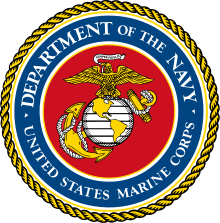VMF-213
| Marine Fighting Squadron 213 | |
|---|---|
|
VMTB-213 Insignia | |
| Active | 1 July 1942 - 24 April 1946 |
| Country | United States |
| Branch | USMC |
| Nickname | Hell Hawks |
| Engagements | |
VMF-213 was a fighter squadron in the United States Marine Corps. The squadron activated 1 July 1942 at Marine Corps Air Station Ewa was also known as the "Hell Hawks".[1] Along with VMF-124, VMF-213 became one of the first Marine squadrons to be based on a fleet aircraft carrier.[2] They were deactivated shortly after the end of World War II but were reactivated in the Marine Air Reserve under the 4th Marine Aircraft Wing and based at Naval Air Station Minneapolis.
In mid-1943, VMF-213 harmonised the six .50 inch wing guns of their Mk I Vought F4U Corsairs to converge to a point 300 ft (90 m) ahead. The squadron's usual tactic was to dive upon an enemy from the front and slightly to one side (a high-side attack using full deflection) and fire when at the convergence distance.[3]
Captain James N. Cupp was a double flying ace with VMF-213 in the Solomon Islands. From July to September 1943 he scored at least 12 aerial victories. He received the Navy Cross and three Distinguished Flying Crosses during his service with the Hell Hawks.[4][5]
Awards
Unit
 Presidential Unit Citation — 3 January – 22 January 1945[6]
Presidential Unit Citation — 3 January – 22 January 1945[6] Presidential Unit Citation — 16 February – 1 March 1945[6]
Presidential Unit Citation — 16 February – 1 March 1945[6]
See also
- United States Marine Corps Aviation
- List of inactive United States Marine Corps aircraft squadrons
- List of United States Marine Corps aircraft squadrons
References
- ↑ Gamble, Bruce (2012). Swashbucklers and Black Sheep a pictorial history of Marine Fighting Squadron 214 in World War II. Minneapolis, MN: MBI Pub. Co. and Zenith Press. p. 12. ISBN 9781610586900.
- ↑ Fredriksen, John C. (2011). The United States Marine Corps a Chronology, 1775 to the Present. Santa Barbara: ABC-CLIO. p. 175. ISBN 9781598845433.
- ↑ Hammell, Eric (2010). Aces Against Japan. Pacifica Military History. p. 132. ISBN 1890988057.
- ↑ Craig, Berry (1989). Chronolog, 1912–1954. Paducah, KY: Turner Publishing Company. p. 86-87. ISBN 0-938021-39-7. OCLC 21866886.
- ↑ Guttman, Jon (Oct 2005). "A Hell Hawk in the Pacific". World War II 20 (6): 50. ISSN 0898-4204.
- ↑ 6.0 6.1 "UNIT AWARDS FOR VMF 213". United States Navy. Retrieved 23 July 2014.
| |||||||||||||||||||||||||||||||||

